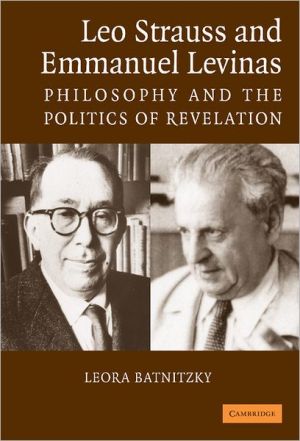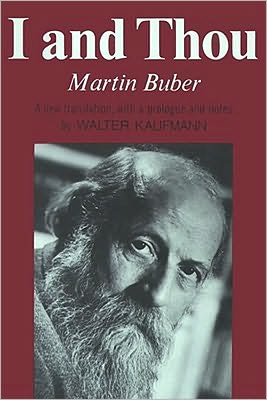Leo Strauss and Emmanuel Levinas: Philosophy and the Politics of Revelation
"Leo Strauss and Emmanuel Levinas, two twentieth-century Jewish philosophers and extremely provocative thinkers whose reputations have grown considerable over the last twenty years, are rarely studied together. This is due to the disparate interests of many of their intellectual heirs." In Leo Strauss and Emmanuel Levinas : Philosophy and the Politics of Revelation, Leora Batnitzky brings together these two seemingly incongruous contemporaries, demonstrating that they often had the same...
Search in google:
Leora Batnitzky brings together two seemingly incongruous contemporaries, demonstrating that their projects had many parallels.
\ Cambridge University Press\ 052186156X - Leo Strauss and Emmanuel Levinas - philosophy and the politics of revelation - by Leora Batnitzky\ Excerpt\ \ PART ONE\ PHILOSOPHY\ \ \ \ \ 1\ \ Strauss and Levinas between Athens and Jerusalem\ While they are rarely considered together, the intellectual biographies of Leo Strauss (1899–1973) and Emmanuel Levinas (1906–95) are remarkably similar. Both attempt to rethink the philosophical possibility of morality after the Nazi genocide and they use many of the same philosophical resources to do so. Both studied with Edmund Husserl and Martin Heidegger in the 1920s, both argue against what each maintains is the amorality of Heidegger’s philosophy, and both claim the German-Jewish philosopher Franz Rosenzweig as a, if not the, major influence in so doing. The exegesis of classic Jewish texts matters greatly to both of them, and each claims to be returning to Plato. Both have had significant Catholic receptions and both continue to have important influences on contemporary discussions of ethics and politics. Nevertheless, despite these striking historical similarities, from the perspective of their contemporary and ever-growing receptions, one might think that Strauss and Levinas do not have much in common, philosophically or politically, with one another. And if one made this claim, it would be based largely on yet another remarkable similarity between Strauss andLevinas, which are their respective constructions of the relation between what Strauss calls “Athens” and “Jerusalem” and what Levinas calls “Greek” and “Hebrew.”\ As has been argued by a number of recent interpreters, the crux of Levinas’s philosophy is his reorientation of “Greek” by way of “Hebrew.” Understood as such, Levinas is thought to be a Jewish philosopher whose achievement is to have revived the Jewish tradition philosophically. In contrast, with the exception of a few recent interpretations, Strauss has been viewed largely as a political philosopher for whom revelation is, at best, of instrumental significance. While Strauss maintained that what he called “Athens” is in necessary tension with what he called “Jerusalem,” many if not most of Strauss’s interpreters continue to argue that Strauss comes down largely on the side of Athens. As such, Levinas’s decidedly Hebrew thought would seem to be opposed philosophically to Strauss’s decidedly Greek thought.\ In this chapter, I begin to attempt to dismantle these assumptions. I argue that there is a formal philosophical affinity between Levinas and Strauss precisely in regard to their arguments about the philosophical possibility of revelation. Once we appreciate this philosophical affinity we must rethink the view of Strauss as an affiliate of Athens and of Levinas as an affiliate of Jerusalem. The difference between Levinas and Strauss, I claim, ultimately reflects a disagreement about the status of modern philosophy. Levinas emerges as a defender of a particularly modern philosophical project that ascribes social and political status to philosophy, while Strauss is a critic of this very project. I suggest in the conclusion of the chapter that rethinking the place of Athens and Jerusalem in Levinas’s and Strauss’s philosophies may provide us not only a fuller understanding of their respective arguments, but also an opportunity to rethink the basic if unspoken premises that inform much contemporary philosophical discussion about the relation between philosophy and revelation, or between Athens and Jerusalem.\ To begin to appreciate the similarities and then differences between Levinas and Strauss, I turn first to a, if not the, quintessential question in considering the relation between Athens and Jerusalem. This question concerns the very possibility of something we might call “Jewish Philosophy.” Section 1.2 of the chapter considers Strauss’s and Levinas’s shared attempt to retrieve different forms of Platonism after Heidegger’s philosophically devastating criticism of the Platonic tradition and its aftermath. Significantly, Strauss and Levinas share not only the attempt to reread Plato after Heidegger, but both also maintain that the medieval Jewish philosopher, Moses Maimonides, holds the key to doing so. This isn’t to deny, of course, Strauss’s and Levinas’s radically different readings of Plato and Maimonides. Rather, by understanding the formal similarities of their projects it is possible to understand the root cause of their differences. In Section 1.3 of the chapter, I argue that this difference concerns their respective definitions of philosophy. In Section 1.4, I suggest Strauss’s and Levinas’s different conceptions of philosophy are ramified in their shared attempt to rethink human nature. In Section 1.5, I begin to develop the implications of these different views of philosophy as they relate to the definitions of Judaism particularly and religion more generally. The conclusion, Section 1.6, considers the relation between Strauss’s and Levinas’s conceptions of philosophy and the problem of evil.\ 1.1. JEWISH PHILOSOPHY BETWEEN ATHENS AND JERUSALEM\ Neither Strauss nor Levinas attempts to harmonize Judaism and philosophy. For Strauss, such a harmonization is impossible because Judaism and philosophy represent two fundamentally opposed attitudes toward the world. Though they both seek wisdom, the beginnings of the wisdom of biblical religion and the beginnings of the wisdom of philosophical reflection are in marked contrast to one another. Philosophy for Strauss is the search for wisdom that begins with the thinker’s unending quest for the nature of the good.1 In contrast, Judaism is rooted in revelation, which begins not in thought, but in obedience to God and the revealed law.\ Strauss argues that we must choose between Jerusalem and Athens not only because they are fundamentally different but also because they are in basic opposition to one another. This doesn’t mean that one can’t be a Jew interested in philosophy or a philosopher interested in Judaism. Indeed, as Strauss puts it, “every one of us can be and ought to be either...the philosopher open to the challenge of theology or the theologian open to the challenge of philosophy.”2 But this formulation only underscores Strauss’s well-known statement that “being a Jew and a philosopher are mutually exclusive”3 because such an identity is self-contradictory.\ Levinas, like Strauss, does not believe in the harmonization of Judaism and philosophy, not because they are fundamentally opposed, but because they are fundamentally alike. In Levinas’s words, “I have never aimed explicitly to ‘harmonize’...both traditions. If they happen to be in harmony it is probably because every philosophical thought rests on pre-philosophical experiences, and...the bible has belonged to these founding experiences.”4 Judaism and philosophy are thus similarly oriented, according to Levinas. Both Judaism and philosophy approach the goodness beyond being embodied in what Levinas calls the responsibility for the other.\ As Levinas puts it, “philosophy derives [dérive] from religion. It is called for by religion adrift [en dérive], and in all likelihood religion is always adrift.”5 Philosophy and religion exist in a relation of mutuality, for Levinas. Philosophy derives from religion, but philosophy also gives direction and purpose to religion. Judaism and philosophy do not need to be harmonized for Levinas because they are already in fundamental harmony with one another. Judaism or what Levinas calls elsewhere “religiosity” (“le religieux”) is the prephilosophical stuff out of which philosophy arises. Judaism and philosophy are thus organically connected. From Levinas’s perspective, Jewish philosophy is impossible because it is redundant.\ Jewish philosophy is thus impossible for both Levinas and Strauss, but for opposite reasons. Because Judaism and philosophy ultimately mean the same thing, the notion of Jewish philosophy is at best superfluous for Levinas. In contrast, the notion of Jewish philosophy is incoherent for Strauss because such a notion betrays the meanings of both Judaism and philosophy.\ We have seen that from a formal perspective at least there is an important, if at first unlikely, affinity between Levinas and Strauss on the question of the impossibility of Jewish philosophy. I suggest that this affinity is significant because it rests on a deeper philosophical agreement about the philosophical possibility of the truth of Judaism. While Levinas and Strauss each make a claim for the impossibility of Jewish philosophy, each also claims at the same time that “Judaism” somehow makes not Jewish philosophy possible, but philosophy possible.\ Simply put, the shared claim of Levinas and Strauss is that Judaism understands something that philosophy anticipates but cannot quite articulate on its own terms. Significantly, Levinas and Strauss each make this point with reference to Plato. For both, Plato anticipates revelation. In Totality and Infinity, Levinas maintains that the true universality of reason is predicated upon Plato’s conception of discourse, which “implies transcendence...[and] the revelation of the other to me.”6 It is this Platonic anticipation of revelation that defines ethics as first philosophy, for Levinas. Totality and Infinity is, as its subtitle indicates, “an essay on exteriority.” Philosophy, for Levinas, anticipates the exteriority of revelation. As such, philosophy is bound to revelation, which reorients philosophy. Totality and Infinity ends with a succinct summary of this reorientation:\ Freedom is not justified by freedom. To account for being or to be in truth is not to comprehend nor to take hold of..., but rather to encounter the Other without allergy, that is, in justice.7\ Freedom, for Levinas, which includes philosophical freedom, cannot justify itself on its own terms. My freedom is justified by the other, by the other’s revelation to me.\ Strauss, from a formal perspective at least, makes this very argument about philosophy’s bondage to revelation. Note Strauss’s very Levinasian formulation in Philosophy and Law, in which he argues that philosophy’s “freedom depends upon its bondage. Philosophy is not sovereign. The beginning of philosophy is not the beginning simply.”8 While Philosophy and Law is admittedly a transitional work for Strauss, the theme of philosophy’s dependence on and anticipation of revelation marks Strauss’s mature work. Recall, for instance, Strauss’s argument in Natural Right and History that: “Philosophy has to grant that revelation is possible. But to grant that revelation is possible means to grant that philosophy is perhaps not the one thing needful...or that philosophy suffers from a fatal weakness.”9 The notion that philosophy requires and anticipates revelation is a constant theme throughout Strauss’s writings, a theme that, from a formal perspective at least, parallels Levinas’s own arguments. Of course, the objection to this statement will be, in its strongest form, that Strauss rejects Jerusalem for the sake of Athens or, at the very least, that we don’t know where Strauss comes down on the question of Jerusalem or Athens. In my view, this often stated objection (whatever its form) misses the mark and here the parallels with Levinas are not only important but also decisive.\ But before turning to the implications of comparing Strauss with Levinas for understanding Strauss’s view of revelation, it is important to note that even on “Straussian” terms the question about Strauss’s “own” view of revelation skews the philosophical question that Strauss poses in regard to revelation. As Strauss puts it in regard to Nietzsche, “Through judging others, Nietzsche had himself established the criterion by which his doctrine is to be judged.”10 While a full treatment of Straussian hermeneutics and even more so debates about Strauss’s hermeneutics are beyond the scope of this chapter (but will be discussed in greater detail in Part 3 of this book), it is important to mention that among the criteria by which Strauss is to be judged is Strauss’s own claim that “the problem inherent in the surface of things, and only in the surface of things, is the heart of things.”11 As Strauss puts it in his discussion of the tension between Jerusalem and Athens, “If we wish to understand Plato, we must take him seriously. We must take seriously in particular his defense of Socrates.”12 Just as Strauss urges us to take seriously Plato’s defense of Socrates if we are to take Plato seriously, if we are to take Strauss seriously we must take seriously Strauss’s philosophical arguments about revelation. A comparison with Levinas, I suggest, allows us to appreciate the serious philosophical nature of Strauss’s arguments about revelation.\ If I am right, as I have argued that Jewish philosophy is as impossible for Levinas as it is for Strauss, then what we are able to see is that Levinas and Strauss make very similar claims about the philosophical status of revelation. Indeed, both of their arguments concern not the philosophical veracity of “Judaism” and revelation – for both Levinas and Strauss, such a proof would be impossible – but the inadequacy of philosophy conceived without “Judaism” or revelation. Indeed, Strauss, like Levinas, poses a fundamental question about philosophy’s need to recognize its own possible bondage to something outside of philosophy. Understood in this way, it does not matter what Strauss’s “own” views of revelation actually are for the philosophical question remains the same: does philosophy require the philosophical possibility of revelation?\ To begin to answer this question, let us return to Strauss’s treatment of Plato. Like Levinas, Strauss makes his argument about the philosophical need of revelation with reference to Plato. For Strauss, it is the Plato of the Laws and not of the Republic (or as Levinas argues in greater detail in Totality and Infinity : the Plato of the Phaedrus) that is definitive for recognizing philosophy’s anticipation of revelation. While I do not mean to discount the different conceptions of ethics and politics that emerge from Strauss’s and Levinas’s respective interpretations of Plato, note the striking formal similarity of Strauss’s and Levinas’s use of Plato. Each uses Plato to argue for philosophy’s anticipation of revelation. Strauss argues that in the Laws :\ Plato transforms the ‘divine laws’ of Greek antiquity into truly divine laws, or recognizes them as truly divine laws. In this approximation to the revelation without the guidance of the revelation we grasp at its origin the unbelieving, philosophic foundation of the belief in revelation....Platonic philosophy had suffered from an aporia in principle that had been remedied only by the revelation.13\ Here Strauss’s argument is in the service of establishing an analysis of the life world of medieval Jewish philosophy in which “before all philosophizing the fact of revelation remains firm.”14 Like Levinas, Strauss attempts to describe the prephilosophical life world out of which philosophy arises. As Levinas does for the Bible, Strauss does for medieval Jewish philosophy. Levinas’s and Strauss’s analyses of these respective premodern “Jewish” life worlds are in the service of establishing the possibility of the truth of revelation, a possibility that for both Levinas and Strauss must alter our very conceptions of ethics and politics in the contemporary world. As Levinas puts it in the outline of his doctoral thesis, which became Totality and Infinity, ethics:\ is not a byproduct of self-knowledge. It is completely heteronomous....To state that the Other, revealed by the visage, is the first intelligible...is to affirm also the independence of ethics with regard to history....To show that the first signification emerges in morality...is a return to Platonism.15\ 1.2. AFTER HEIDEGGER: MAIMONIDES BETWEEN ATHENS AND JERUSALEM\ Levinas’s and Strauss’s shared interest in returning to Plato is historically specific. Both respond to the Nazi genocide by searching for a way to speak with authority about morality and both consider a return to Platonism the possibility for doing so. While Strauss’s interest in a philosophical turn to Plato took place in the 1930s (as we will see in the following discussion of Philosophy and Law), his mature reading of Plato developed in the context of his attempt to respond to the rise of National Socialism. There were also philosophical seeds of Levinas’s interest in returning to Plato in the 1930s. But like Strauss’s developed thought, Levinas’s mature understanding of Plato took place in the context of an attempt to respond to the moral challenge posed by National Socialism. In their mature attempts to return to Plato, both respond philosophically first and foremost to Martin Heidegger’s effort to put an end to the metaphysical tradition. For both Strauss and Levinas, in declaring an end to metaphysics Heidegger also declared an end to absolute claims about morality.\ In a 1957 lecture titled “The Onto-theological Constitution of Metaphysics” (a lecture that concluded a course on Hegel’s Science of Logic), Heidegger argued that the western philosophical tradition is onto-theological in nature. Onto-theology is the metaphysical quest to ground the being of entities in the being of a highest entity, but onto-theology also characterizes what Heidegger contends is the western philosophical tradition’s fundamental forgetfulness of Being. Heidegger maintained that theology’s quest to ground the being of entities in the being of a highest entity is made possible by the error of metaphysics, which is the inability to distinguish between the being of entities and the being of Being. The overcoming of metaphysics, for Heidegger, is thus by definition also the overcoming of theology (which he understands as always being “onto-theology”), as it has been known historically.\ From Levinas’s and Strauss’s perspectives, Jewish thought does not fit into Heidegger’s category of onto-theology because it is not concerned primarily with onto-theological issues (such as foundational or metaphysical proofs of God’s existence). But this doesn’t mean, however, that Jewish thought is not concerned with metaphysics. The possibility of a return to metaphysics for Levinas and Strauss is not fundamentally ontological in character. Rather, Levinas and Strauss both maintain that Jewish thought is concerned with a kind of metaphysics that is not utilized for the purpose of ontological grounding, but rather for its ethical or political implications.\ To be sure, it is important to distinguish Levinas’s notion of ethics from Strauss’s notion of politics. The former concerns, as Levinas might put it, being for the other, while the latter concerns, as Strauss might put it, the collective pursuit of the good life, or justice.16 There is no doubt that the rhetoric of Levinas’s descriptions of ethics and Strauss’s descriptions of politics are exceptionally different. Yet the definitions of what Levinas calls ethics and what Strauss calls politics are in a significant sense remarkably similar. We can appreciate this similarity by turning briefly to Maimonides’s discussion of the relation between the perfection of the body and the perfection of the soul, a discussion to which neither Levinas nor Strauss refers, but which, I suggest, nonetheless illuminates this important overlap in their thoughts.\ Levinas’s view of ethics is captured in the phrase he is fond of quoting from Rabbi Israel Salanter, the sage of the nineteenth-century Mussar movement: “The other’s material needs are my spiritual needs.”17 In keeping with Maimonides, I suggest, Strauss’s view of politics is also predicated on the notion of the just fulfillment of the physical needs of others. Maimonides maintains in the Guide of the Perplexed that:\ It is obvious that this ultimate perfection [of the soul] does not carry with it any actions or moral qualities...[yet] this glorious ultimate perfection cannot be attained unless the first form of perfection [of the body] has been achieved....The true law, which, as we have explained, is the only and unique one, namely the law of Moses, has been given so as to bestow upon us the two kinds of perfection [of the body and the soul] together. It [the perfection of the body] provides for the improvement of human relationships by removing injustice and inculcating good and generous habits.18\ For Maimonides, the political good involves, as Levinas would have it in terms of ethics, the fulfillment of physical needs, of “food and other requisites of his body, such as shelter, baths, etc.”19 Beyond rhetoric, Strauss’s conception of the requirements of politics parallels Levinas’s conception of the requirements of ethics. Politics for Strauss, and ethics for Levinas, concerns the physical needs of other people.\ Where Levinas differs from Strauss is in insisting that there is no equal or higher good than meeting the physical needs of others.20 As Strauss puts it, in a statement that very much parallels, but does not cite Maimonides, “The philosopher is the man who dedicates his life to the quest of knowledge of the good, of the idea of the good; what we would call moral virtue is only the condition or by-product of that quest.”21 For Levinas, meeting the physical needs of the other constitutes ethics. One of the tasks of this book is to consider more deeply the implications, and indeed the ethical implications, of this difference between Levinas and Strauss. In Part 3 of this book we will deal with these implications more fully. Here, however, we need first to appreciate the formal similarities between Strauss’s and Levinas’s thought to begin to gauge their real differences.\ Both Levinas and Strauss claim that it is necessary to reread Plato after Heidegger and Jewish revelation, and particularly the philosophy of Maimonides, makes it possible to do so. As Heidegger remarked in his Nietzsche lectures, “ ...all Western philosophy is Platonism. Metaphysics, Idealism, and Platonism mean essentially the same thing...Plato has become the prototypal philosopher.”22 In an early work defining his philosophical agenda, Levinas revalues this very assertion of Heidegger’s, declaring that “all philosophy is Platonic.”23 Levinas, like Strauss, seeks to resuscitate Plato after Heidegger has declared an end of metaphysics. For both Levinas and Strauss, it is not just biblical revelation, but more specifically the coordination of Athens and Jerusalem or Greek and Hebrew, in Maimonides’s thought, which holds the key to rereading Plato after Heidegger.\ \ \ \ \ © Cambridge University Press
1Strauss and Levinas between Athens and Jerusalem32Levinas's defense of modern philosophy : how Strauss might respond283'Freedom depends upon its bondage' : the shared debt to Franz Rosenzweig574An irrationalist rationalism : Levinas's transformation of Hermann Cohen755The possibility of premodern rationalism : Strauss's transformation of Hermann Cohen946Against utopia : law and its limits1177Zionism and the discovery of prophetic politics1408Politics and hermeneutics : Strauss's and Levinas's retrieval of classical Jewish sources1639Revelation and commandments : Strauss, Levinas, and the theologico-political predicament18110Concluding thoughts : progress or return?204








